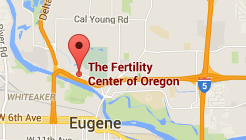Polycystic ovary syndrome (PCOS) is the most common cause of infertility in women. PCOS is common, affecting up to 15 percent of women. It is inherited, but environmental factors can determine whether it will become symptomatic or cause problems for any individual woman. Heavier women with PCOS are more likely to have symptoms than thinner women with PCOS.
The most common complaints of women with PCOS are irregular (or absent) menstrual periods, unwanted hair growth, especially on the face, and acne. Many women with PCOS also have insulin resistance, making it easy to gain weight and very difficult to lose weight. Difficulty getting pregnant and a higher rate of miscarriage in the first trimester are also seen.
A higher than usual level of testosterone is characteristic of PCOS and can cause facial hair and acne. High testosterone plus high insulin can cause ovarian malfunction, including a lack of ovulation and irregular periods. In the ovary of a woman with PCOS, more than usual small follicles (the fluid-filled sacs containing eggs) seen on ultrasound. This causes the ovary to be bigger than average and leads to the term “polycystic.” A follicle is a particular type of functional cyst which all women of reproductive age have.
If PCOS is suspected, we might perform hormonal testing. We may check follicle-stimulating hormone (FSH), luteinizing hormone (LH), estrogen (E2), total testosterone, DHEA-S and 17-hydroxyprogesterone acetate. These hormones are measured in the blood, usually on the third day of a menstrual period. In a woman who has infrequent or absent periods, we might need to provoke a period (by giving her progestin tablets) so that we can draw blood on the correct cycle day.
A woman with PCOS who has trouble getting pregnant may receive treatment to induce ovulation if she does not ovulate on her own, or “boost” ovulation if she ovulates but not strongly enough. Ovulation induction can be with pills (Clomid or Letrozole) or injections (of FSH and LH). If we think a woman also has insulin resistance, we might add metformin, which is an insulin-sensitizing medication.
The name “polycystic ovary syndrome” makes it sound like this disorder only affects the ovaries and reproductive function. However, PCOS is primarily a metabolic syndrome and affects many other body systems. Women with PCOS have an increased risk of obesity, hypertension, lipid abnormalities, gestational diabetes, adult-onset diabetes, cardiovascular disease, and uterine cancer.
Treatment for PCOS in women who are not trying to conceive may include:
- The use of birth control pills (regulates cycles, lessens acne and hair growth)
- Use of insulin-sensitizing drugs
- Use of antiandrogens like spironolactone
- Hair removal techniques like electrolysis or lasers
- Weight loss techniques, including bariatric surgery
PCOS symptoms and complications vary dramatically, with some women having very few problems and others facing a lifelong struggle with poor health.

